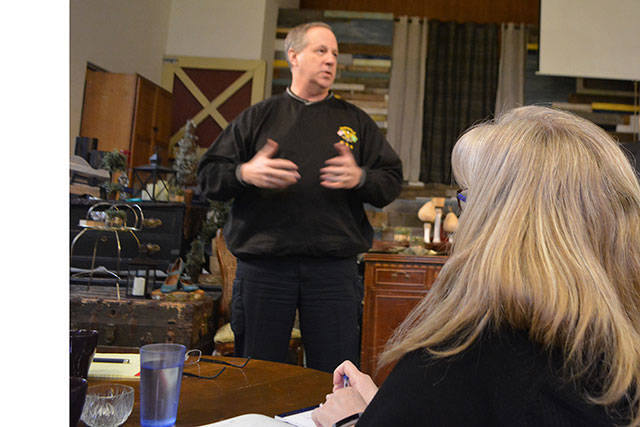MARYSVILLE – Officials said Monday they plan to arrest people for drug offenses even though the county prosecutor said recently he will not charge them unless their crime meets a certain criteria.
Police Chief Rick Smith and Mayor Jon Nehring said at the mayor’s Coffee Klatch that cases will still be sent to Mark Roe, even if they are sent back to Marysville Municipal Court. The criminal won’t get the felony conviction, but still can be convicted of a misdemeanor.
The opioid epidemic and related crimes, along with panhandling and the homeless, made up the majority of the discussion at the event at the Living Room Coffee House. Nehring said police are going to very soon be working with an embedded social worker who will try to get help for the homeless who want it.
“It’s the only way to get them out of addiction,” he said, adding the cycle of just arresting people doesn’t work. Participants will go through 72 hours of detox, then get into a program for up to 60 days. They will then be helped to try to get housing.
Roe said his department no longer has the time to prosecute low-level drug users. Nehring said that “hinders the effect” of the city’s efforts, but Smith said, “We’re still going after it hard.”
The community can help by not giving money to panhandlers, Nehring said. “They use the money to feed their heroin addiction and destroy their lives.” It’s better to donate money to organizations that serve the homeless, he said, adding panhandlers will stop if they don’t get money.
As for the embedded social worker, Nehring said it is a two-year pilot project that has worked elsewhere with marginal success. It won’t solve the problem but a year from now some people will have been helped and be off the streets. Smith said people aren’t arrested for being homeless, only when they commit crimes. Stealing for drug money is the most-common one.
Even the mayor has been a victim of that. He said he had money stolen from his locker while he was working out at a gym recently.
They said arresting someone and putting them in the city jail for even a few days can be a deterrent for a heroin addict because they get sick. “This is not an attractive community for them to be in,” Nehring said.
Smith concurred.
“Marysville is not the place for them to be,” the chief said, adding transient crime happens all along I-5, but it’s actually down locally.
City officials were asked what can be done about panhandlers on the I-5 offramps at Fourth Street. There were complaints about them walking in front of cars and holding up traffic – public safety issues. They said because it’s a highway the laws are “delicate” but police can try to get them to “move along.”
Regarding garbage around town, Public Works Director Kevin Nielsen said, “My pet peeve is trash and litter. That’s the last thing Marysville citizens want to see.” He said homeless camps can take weeks to clean up. “There are dump trucks full of trash,” he said. “Way back in the woods they are like full-blown cities.” Nielsen said homeless can move quickly – like in one day – to stay away “from the guys in blue.”
In other discussions:
•As for code enforcement, Nehring said hundreds of cars in town have been removed due to the tighter code written at the direction of the City Council. While cleanup efforts are complaint-driven, he said the city can sweep the town again now that winter is over.
•Regarding growth, Nehring said commercial always follows rooftops. He said thanks to retail businesses their sales taxes have allowed residents not to have their taxes increase in a decade. But the city wants to bring in higher-wage jobs so people can work here rather than commute.
Planning director Dave Koenig said a construction company and fish processing business, along with recycle and electrical firms, have shown interest in the Manufacturing Industrial Center near the Arlington airport.
•Concerning the waterfront, the city continues to clean it up with the hope of private businesses coming in. As a public agency, the city can get grants to do the job. “The private sector would be remiss” if it didn’t take advantage of the waterfront, Chief Administrative Officer Gloria Hirashima said.
•Asked about a city Fourth of July event, Nehring said it won’t happen this year, but a survey is being done to see what the community wants.
•As for paving roads, Nielsen said the city focuses on arterials used the most as they are the most expensive to replace. Water getting into cracks in roads is what leads them to fail.
To conclude, Nehring was asked what the community can do to help the city.
Nehring said he would appreciate if people could set the naysayers straight. “I’m done accepting that narrative,” with people being so negative online, he said. “Get on social media and tell about all the positive things” going on in the city. “I’ve seen it done, and it does some good.”



